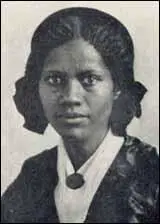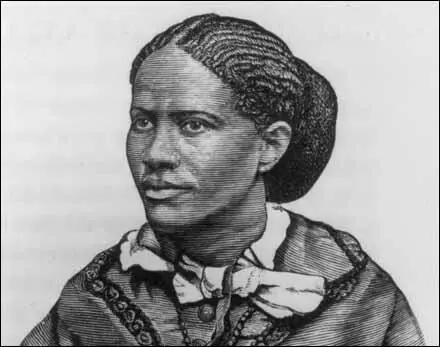Frances Harper

Frances Harper was born in Baltimore on 24th September, 1825. Her mother died three years later and she was looked after by relatives. Frances was educated at a school run by her uncle, Rev. William Watkins until the age of thirteen when she found work as a seamstress.
Harper wrote poetry and her first volume of verse, Forest Leaves, was published in 1845. The book was extremely popular and over the next few years went through 20 editions.
In 1850 Harper obtained employment as a teacher in Columbus, Ohio, but in 1853 became a travelling lecturer for the American Anti-Slavery Society. She was also a strong supporter of prohibition and woman's suffrage. She often read her poetry at these public meetings, including the extremely popular Bury Me in a Free Land.
Other volumes of poetry published by Harper include Poems on Miscellaneous Subjects (1854), Moses: A Story of the Nile (1869) and Sketches of Southern Life (1872). Harper was a strong supporter of women's suffrage and was a member of the American Woman Suffrage Association (AWSA).
Her first novel, Iloa Leroy, a story about a rescued black slave, appeared in 1892. This was followed by Minnie's Sacrifice, Sowing and Reaping and Trial and Triumph. Frances Harper died on 22nd February, 1911.

Slavery in the United States (£1.29)
Primary Sources
(1) Frances Harper, Bury Me in a Free Land (1845)
Make me a grave wher’er you will,
In a lowly plain, or a loft hill;
Make it among earth’s humblest graves,
But not in a land where men are slaves.
I could not rest if around my grave
I heard the steps of a trembling slave;
His shadow upon my silent tomb
Would make it a place of fearful gloom…
I would sleep, dear friends, where bloated might
Can rob no man of his dearest right;
My rest shall be calm in any grave
Where none can call his brother a slave.
I ask no monument proud and high,
To arrest the gaze of the passers-by;
All that my yearning spirit craves,
Is bury me not in a land of slaves.
(2) Frances Harper, Ethiopia (1845)
Yes, Ethiopia yet shall stretch
Her bleeding hands abroad;
Her cry of agony shall reach
The burning throne of God.
The tyrant's yoke from off her neck,
His fetters from her soul,
The mighty hand of God shall break
And spurn the base control.
Redeemed from dust, and freed from chains,
Her sons shall lift their eyes;
From lofty hills and verdant plains
Shall shouts of triumph rise.
Upon the dark, despairing brow
Shall play a smile of peace;
For God shall bend unto her woe,
And bid her sorrows cease.
'Neath sheltering vines and stately palms
Shall laughing children play;
And aged sires, with joyous psalms,
Shall gladden every day.
Secure by night and blest by day,
Shall pass her happy hours;
Within her peaceful bowers.
Thy bleeding hands abroad;
Thy cry of agony shall reach
And find the throne of God.
(3) Frances Harper, To the Union Savers of Cleveland (1845)
Men of Cleveland, had a vulture
Sought a timid dove for prey
Would you not, with human pity,
Drive the gory bird away?
Had you seen a feeble lambkin,
Shrinking from a wolf so bold,
Would ye not to shield the trembler,
In your arms have made its fold?
But when she, a hunted sister,
Stretched her hands that ye might save,
Colder far than Zembla's regions,
Was the answer that ye gave.
On the Union's bloody altar,
Was your hapless victim laid;
Mercy, truth, and justice shuddered,
But your hands would give no aid.
And ye sent her back to the torture,
Robbed of freedom and of fright.
Thrust the wretched, captive stranger.
Back to slavery's gloomy night.
Back where brutal men may trample,
On her honor and her fame;
And unto her lips so dusky,
Press the cup of woe and shame.
There is blood upon our city,
Dark and dismal is the stain;
And your hands would fail to cleanse it,
Though Lake Erie ye should drain.
There's a curse upon your Union,
Fearful sounds are in the air;
As if thunderbolts were framing,
Answers to the bondsman's prayer.
Ye may offer human victims,
Like the heathen priests of old;
And may barter manly honor
For the Union and for gold.
But ye can not stay the whirlwind,
When the storm begins to break;
And our God doth rise in judgment,
For the poor and needy's sake.
And, your sin-cursed, guilty Union,
Shall be shaken to its base,
Till ye learn that simple justice,
Is the right of every race.
(4) Frances Harper, The Dying Bondman (1845)
Life was trembling, faintly trembling
On the bondman's latest breath,
And he felt the chilling pressure
Of the cold, hard hand of Death.
He had been an Afric chieftain,
Worn his manhood as a crown;
But upon the field of battle
Had been fiercely stricken down.
He had longed to gain his freedom,
Waited, watched and hoped in vain,
Till his life was slowly ebbing --
Almost broken was his chain.
By his bedside stood the master,
Gazing on the dying one,
Knowing by the dull grey shadows
That life's sands were almost run.
"Master," said the dying bondman,
"Home and friends I soon shall see;
But before I reach my country,
Master write that I am free;
"For the spirits of my fathers
Would shrink back from me in pride,
If I told them at our greeting
I a slave had lived and died;
"Give to me the precious token,
That my kindred dead may see --
Master! write it, write it quickly!
Master! write that I am free!"
At his earnest plea the master
Wrote for him the glad release,
O'er his wan and wasted features
Flitted one sweet smile of peace.
Eagerly he grasped the writing;
"I am free!" at last he said.
Backward fell upon the pillow,
He was free among the dead.
(5) Frances Harper, speech at the National Council of Women of the United States in Washington (22nd February, 1891)
I deem it a privilege to present the negro, not as a mere dependent asking for Northern sympathy or Southern compassion, but as a member of the body politic who has a claim upon the nation for justice, simple justice, which is the right of every race, upon the government for protection, which is the rightful claim of every citizen, and upon our common Christianity for the best influences which can be exerted for peace on earth and goodwill to man.
Our first claim upon the nation and government is the claim for protection to human life. That claim should lie at the basis of our civilization, not simply in theory but in fact. Outside of America, I know of no other civilized country, Catholic, Protestant, or even Mahometan, where men are still lynched, murdered, and even burned for real or supposed crimes.
A government which has power to tax a man in peace, and draft him in war, should have power to defend his life in the hour of peril. A government which can protect and defend its citizens from wrong and outrage and does not is vicious. A government which would do it and cannot is weak; and where human life is insecure through either weakness or viciousness in the administration of law, there must be a lack of justice, and where this is wanting nothing can make up the deficiency.
The strongest nation on earth cannot afford to deal unjustly towards its weakest and feeblest members. I claim for the Negro protection in every right with which the government has invested him. Whether it was wise or unwise, the government has exchanged the fetters on his wrist for the ballot in his right hand, and men cannot vitiate his vote by fraud, or intimidate the voter by violence, without being untrue to the genius and spirit of our government, and bringing demoralization into their own political life and ranks. Am I here met with the objection that the Negro is poor and ignorant, and the greatest amount of land, capital, and intelligence is possessed by the white race, and that in a number of States Negro suffrage means Negro supremacy?
It is said the Negro is ignorant. But why is he ignorant? It comes with ill grace from a man who has put out my eyes to make a parade of my blindness, - to reproach me for my poverty when he has wronged me of my money. If the Negro is ignorant, he has lived under the shadow of an institution which, at least in part of the country, made it a crime to teach him to read the name of the ever-blessed Christ. If he is poor, what has become of the money he has been earning for the last two hundred and fifty years? Years ago it was said cotton fights and cotton conquers for American slavery. The Negro helped build up that great cotton power in the South, and in the North his sigh was in the whir of its machinery, and his blood and tears upon the warp and woof of its manufactures.
But there are some rights more precious than the rights of property or the claims of superior intelligence: they are the rights of life and liberty, and to these the poorest and humblest man has just as much right as the richest and most influential man in the country. Ignorance and poverty are conditions which men 'outgrow. Since the sealed volume was opened by the crimson hand of war, in spite of entailed ignorance, poverty, opposition, and a heritage of scorn, schools have sprung like wells in the desert dust. It has been estimated that about two millions have learned to read. Colored men and women have gone into journalism. Some of the first magazines in the country have received contributions from them. Learned professions have given them diplomas. Universities have granted them professorships. Colored women have combined to shelter orphaned children. Tens of thousands have been contributed by colored persons for the care of the aged and infirm. Millions of dollars have flowed into the pockets of the race, and freed people have not only been able to provide for themselves, but reach out their hands to impoverished owners.
Instead of taking the ballot from his hands, teach him how to use it, and to add his quota to the progress, strength, and durability of the nation.
Underlying this racial question, if I understand it aright, is one controlling idea, not simply that the Negro is ignorant; that he is outgrowing; not that he is incapable of valor in war or adaptation in peace. On fields all drenched with blood he made his record in war, abstained from lawless violence when left on the plantation, and received his freedom in peace with moderation. But he holds in this Republic the position of an alien race among a people impatient of a rival. And in the eyes of some it seems that no valor redeems him, no social advancement nor individual development wipes off the ban which clings to him. It is the pride of Caste which opposed the spirit of Christ, and the great work to which American Christianity is called is a work of Christly reconciliation.


